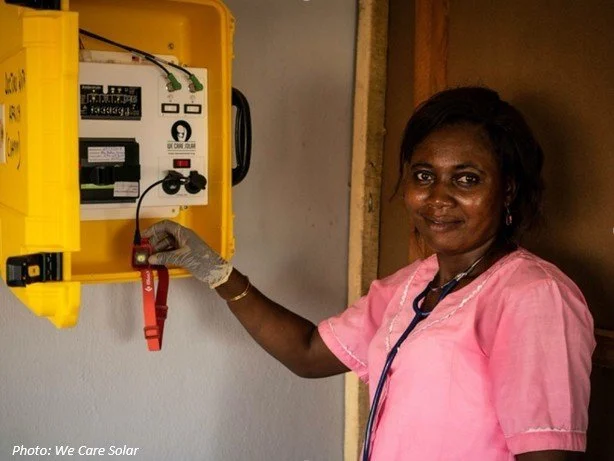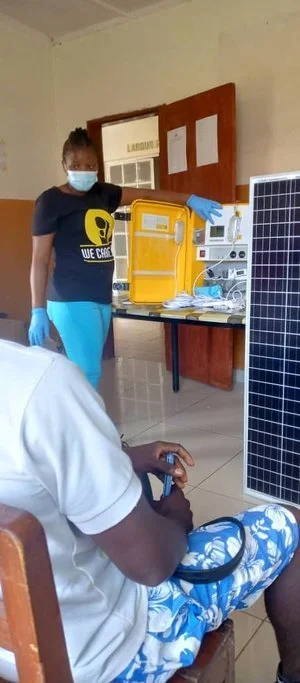All Women Team of PV Installers Reach Maternal Health Clinics in Sierra Leone
By: Laura Walters, Carol Weis, Amy Donhauser, Chris Brooks
In Sierra Leone, a team of women solar technicians can now be found installing off-grid lighting and cell phone charging systems on maternal health clinics - bringing light to women’s birth deliveries, newborn care, and providing communication for the midwives when help is needed.
We Care Solar, a longtime partner of Remote Energy, implements country-wide programs that provide solar-powered lighting and emergency communications to rural maternal health clinics. We Care Solar saw an opportunity to involve more women on their installation team and contacted Remote Energy’s Global Women’s Solar Program which specializes in solar technical training programs taught for women, by women. The collaboration led to a WCS pilot training program and the hiring of an all-female installation team. The program aimed to not only increase the number of women employed by WCS to install Solar Suitcases, but to break down barriers that stand in the way of technical training opportunities and jobs for women. Promoting the presence of female solar technicians as role models and breaking down gender barriers was an opportunity nobody could miss.
Globally, technical jobs in the PV industry, a sector historically dominated by men, offer huge potential for women when they have access to targeted training, mentorship, and resources. The Sierra Leone Women’s Solar Training Pilot demonstrated a meaningful and successful way to engage women in targeted training that addresses the gender biased barriers and cultural perceptions that inhibit the opportunities and upward mobility of women. But there are other concerns that the WCS in-country leads have expressed about including women technicians which are primarily related to culture and safety. The teams often travel to remote locations and the accommodation arrangements are not always clear. It was not considered appropriate for team members of mixed gender to share rooms, and it could be difficult for the women to leave their homes for extended periods. Another challenge was that the women had very limited opportunity to practice using tools — primarily because of cultural norms — which resulted in difficulties gaining the required installation skills and the confidence to work independently in the field.
These issues were brought to light when Remote Energy conducted a gap analysis which included interviews with many of the PV installers. The RE training team quickly adapted the program and curriculum to include practical training solutions like in-person labs for students to practice using hand tools, drills, and ladders. In addition, new installers were given the opportunity to complete 5 installations accompanied by a seasoned WCS installer to guide and answer on-the-job questions.
The installation team is back in the field and bringing reliable light, electricity and hope to rural clinics in Sierra Leone, if you want to read more, click here.
To learn more about Remote Energy’s Global Women’s Program, click here.



